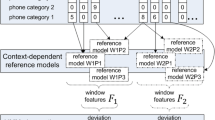Abstract
Detection of long-lasting stress in its early stage may allow prevention of irreversible health damages, but most of today’s stress detectors are not sufficiently convenient for long-term use. Some detectors rely on wearable physiological devices, known to have high abandonment rate, whereas other systems collect only behavioural data, but require each user to report occurrences of his/her stress during at least a month because behavioural patterns notably vary between individuals. Therefore, behaviour-based stress detection models should be learned separately for each person, and in existing systems such learning is typically supervised. In contrast, this work proposes a person-specific stress monitoring system, requiring no efforts from end users. This system acquires users’ motion trajectories via in-office depth cameras and employs a novel unsupervised method for analysis of these trajectories, based on discrete Hidden Markov Models. In 10-months-long real life study the proposed system correctly recognised the most stressful working periods of the monitored subjects and pointed out the most stress-prone persons.
This work was supported by the Finnish Funding Agency for Technology and Innovation (Tekes) and VTT Technical Research Centre of Finland (ITEA 3 15008 ESTABLISH project).
Access this chapter
Tax calculation will be finalised at checkout
Purchases are for personal use only
Similar content being viewed by others
References
Adams, P., et al.: Towards personal stress informatics: comparing minimally invasive techniques for measuring daily stress in the wild. In: PervasiveHealth 2014, pp. 72–79 (2014)
Alberdi, A., Aztiria, A., Basarab, A.: Towards an automatic early stress recognition system for office environments based on multimodal measurements: a review. J. Biomed. Inf. 59, 49–75 (2016)
Bogomolov, A., Lepri, B., Ferron, M., Pianesi, F., Pentland, A.: Pervasive stress recognition for sustainable living. In: PERCOM Workshops, pp. 345–350 (2014)
Ferdous, R., Osmani, V., Mayora, O.: Smartphone app usage as a predictor of perceived stress levels at workplace. In: PervasiveHealth 2015, pp. 225–228 (2015)
Garcia-Ceja, E., Osmani, V., Mayora, O.: Automatic stress detection in working environments from smartphones’ accelerometer data: a first step. IEEE J. Biomed. Health Inf. 20(4), 1053–1060 (2016)
Maxhuni, A., Hernandez-Leal, P., Sucar, L.E., Osmani, V., Morales, E.F., Mayora, O.: Stress modelling and prediction in presence of scarce data. J. Biomed. Inf. 63, 344–356 (2016)
Muaremi, A., Arnrich, B., Tröster, G.: Towards measuring stress with smartphones and wearable devices during workday and sleep. BioNanoScience 3(2), 172–183 (2013)
Aigrain, J., Dubuisson, S., Detyniecki, M., Chetouani, M.: Person-specific behavioural features for automatic stress detection. In: FG 2015, vol. 3, pp. 1–6 (2015)
Koldijk, S., Neerincx, M.A., Kraaij, W.: Detecting work stress in offices by combining unobtrusive sensors. IEEE Trans. Affect. Comput. 9, 227–239 (2018)
Vildjiounaite, E., Mäkelä, S.-M., Keränen, T., Kyllönen, V., Huotari, V., Järvinen, S., Gimel’farb, G.: Unsupervised illness recognition via in-home monitoring by depth cameras. Pervasive Mob. Comput. 38(1), 166–187 (2017)
Vildjiounaite, E., Kallio, J., Mäntyjärvi, J., Kyllönen, V., Lindholm, M., Gimel’farb, G.: Unsupervised stress detection algorithm and experiments with real life data. In: EPIA 2017: Progress in Artificial Intelligence, pp. 95–107 (2017)
Lamb, S., Kwok, K.C.S.: A longitudinal investigation of work environment stressors on the performance and wellbeing of office workers. Appl. Ergon. 52, 104–111 (2016)
Sano, A., Picard, R.W.: Stress recognition using wearable sensors and mobile phones. In: 2013 Humaine Association Conference on Affective Computing and Intelligent Interaction (ACII), pp. 671–676 (2013)
Acknowledgment
This research has been conducted as a part of the ITEA 3 15008 ESTABLISH project. We thank test subjects for their efforts to provide stress labels during a long study.
Author information
Authors and Affiliations
Corresponding author
Editor information
Editors and Affiliations
Rights and permissions
Copyright information
© 2019 Springer Nature Switzerland AG
About this paper
Cite this paper
Vildjiounaite, E., Huotari, V., Kallio, J., Kyllönen, V., Mäkelä, SM., Gimel’farb, G. (2019). Detection of Prolonged Stress in Smart Office. In: Arai, K., Kapoor, S., Bhatia, R. (eds) Intelligent Computing. SAI 2018. Advances in Intelligent Systems and Computing, vol 857. Springer, Cham. https://doi.org/10.1007/978-3-030-01177-2_90
Download citation
DOI: https://doi.org/10.1007/978-3-030-01177-2_90
Published:
Publisher Name: Springer, Cham
Print ISBN: 978-3-030-01176-5
Online ISBN: 978-3-030-01177-2
eBook Packages: Intelligent Technologies and RoboticsIntelligent Technologies and Robotics (R0)




